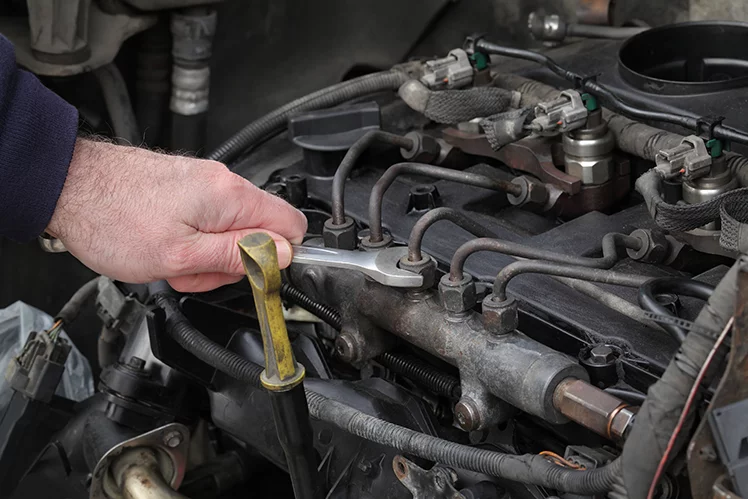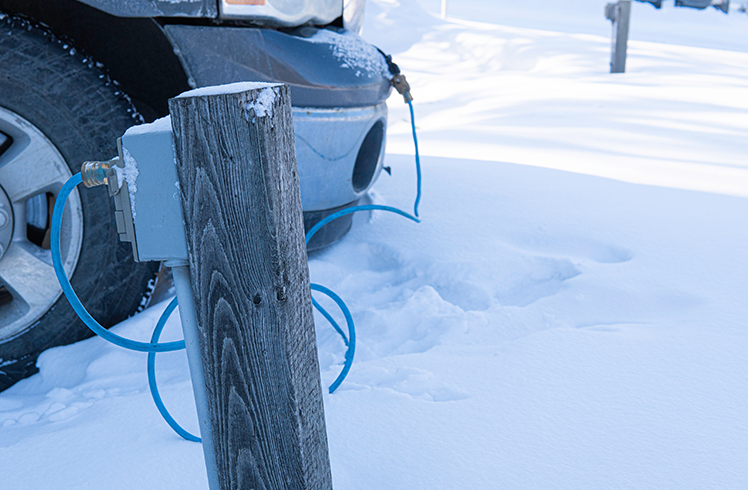
09/17/24
By Rich Guida
Diesel trucks offer several advantages compared to their gas counterparts. They have long been the backbone of multiple industries and are essential for those seeking power, durability, and towing capabilities.
If you're considering purchasing your first diesel truck, you're entering a world of high torque, reliability, and ruggedness that can be immensely rewarding. However, you may experience some sticker shock compared to a gasoline truck. Overall, there are several key aspects to understand before diving into the diesel ownership experience, especially for newcomers in this domain.
What should a first-time diesel owner know? Here is some crucial information about your potential new diesel-powered truck or vehicle.
First off, there are some basic differences between diesel and gas engines. Diesel engines differ from gasoline engines primarily in their combustion process. Gasoline engines use spark plugs to ignite a mixture of fuel and air, while diesel engines compress air until it becomes hot enough to ignite the diesel fuel injected into the combustion chamber. This fundamental variance leads to several distinctions.
One is fuel efficiency. Diesel engines generally have higher thermal efficiency due to their compression ignition process. They extract more energy from the fuel, resulting in greater fuel efficiency than gasoline engines.
Another difference between a gasoline and diesel-powered vehicle is the amount of torque each produces. Diesel engines generate higher torque at lower RPMs than gasoline engines, making them better suited for heavy-duty tasks like hauling and towing. This torque advantage is vital for moving heavy loads efficiently.
Thanks to that extra torque, a diesel truck is far superior to a gas truck at hauling heavy loads and towing trailers. Their robust construction and torque delivery make them ideal for demanding tasks.
More differences can be observed between gas and diesel vehicles during resale. Diesel cars, and especially diesel pickup trucks, often retain their value better than those run on gasoline. This is partly due to their reputation for durability and longevity, especially in industries where heavy-duty performance is essential. Also, diesel engines tend to last longer than those in traditional gas vehicles.

One of the biggest differences between diesel and gas vehicles lies in their parts. For example, gasoline engines have spark plugs to ignite fuel; diesel engines have glow plugs to help heat up compressed air in the cylinder.
While both engines utilize fuel injectors, diesel fuel injectors require significantly higher injection pressure because diesel is heavier than gasoline. More pressure is required to atomize the fuel.
What this all means is that there are different maintenance requirements when it comes to either type of vehicle. Neglecting maintenance in your diesel vehicle can lead to extremely costly damage and repairs.
Purchasing any new car or truck is a big investment. If you are considering a diesel car or diesel pickup truck, the cost can be even higher. However, long-term savings may offset the initial cost if you treat your diesel right.
Some diesel owners also opt to buy used. Buying used diesel trucks can be advantageous due to the potentially lower purchase price. A well-maintained diesel vehicle is usually long-lasting. It may be an excellent cost-saving option if you ensure thorough inspection for wear and tear and maintenance history.

The initial costs for diesel trucks and cars are often higher than gasoline vehicles due to more robust components and advanced technology. The long-term savings come into play by way of vehicle life and less fuel consumption.
Diesel fuel is denser than gasoline, which means it contains more energy per gallon. While diesel may often cost more than gas, it lasts longer as well. Diesel engines have higher compression ratios, contributing to their thermal efficiency. Because diesel engines use direct fuel injection during combustion, they also waste less fuel.
Diesel engines burn fuel at a slower rate than those that use gas because they can produce the same amount of power with fewer revolutions per minute (RPM). The less you have to fill the fuel tank, the better.
While diesel trucks and cars sometimes have slightly higher maintenance costs than gas trucks and cars, their durability is generally superior. Regular maintenance, including fuel filter and oil changes, is crucial for optimal performance and longevity. This care can lead to an exceptionally long lifespan for your heavy duty truck.
Diesel engines have some mechanical complexities. Diesel truck maintenance is key to making your vehicle last. Working on diesel trucks isn’t inherently more difficult than working on a gasoline pickup truck, but there are differences.
Due to differences in components and systems, diesel engines may require specific tools and knowledge. While routine maintenance tasks are similar, some repairs might require specialized attention or professional expertise from a diesel mechanic.
It is important that the mechanic you use is familiar with diesel vehicles and their parts. Sourcing a diesel mechanic varies in difficulty depending on where you live and how common diesel vehicles are in your specific area.

The mechanic you use should have a thorough knowledge of diesel engines, including their electrical systems and other moving parts. The more comfortable they are with the technology, the better they can explain important topics to you and other mechanics.
That being said, some consider working on diesel engines to be easier than others. While more complex, the components are designed with maintenance in mind and may actually prove to be easier to see and reach.
Some types of diesel vehicles do have additional service requirements to consider. For instance, there is additional maintenance for vehicles with diesel exhaust fluid (DEF). This fluid must be added every few thousand miles to help reduce harmful emissions. The more you’re towing, the more DEF you use.
It is essential for all diesel engines to be maintained regularly. Oil changes, fuel filter replacements, water control, and consistent cleaning are just a few ways you can save money and minimize downtime.
Whether or not a diesel truck is right for you depends on your everyday needs. Ask yourself what your daily drives look like. How often do you tow on average? How easy is it to find diesel fuel and diesel mechanics in your area? How far are your daily drives on a normal day?

Towing power is a huge draw when considering diesel trucks. If you are frequently towing or hauling heavy loads, a diesel truck can be an invaluable resource. The added power and torque they produce make them perfect for these jobs.
Diesel trucks are great for fuel economy if you drive long distances. But if you take a lot of short trips or live in the city, they may wind up costing you more in fuel consumption. Diesel engines take some time to warm up fully, and if you’re often taking short trips less than five miles, a diesel truck might not be the best option. However, there are still diesel cars to consider if this is the case.

Keep in mind that diesels are also susceptible to the cold. They can be more difficult to start in winter weather, and you will have to use a mix of winterized diesel, fuel additives, and various heat sources to prevent issues during freezing temperatures.
Given that diesel trucks are more expensive at the outset and can cost a bit more to maintain, the added expense may not be worth it if you don’t truly need the power. Choose diesel for power over speed and long distances over short distances. But you don’t have to fear being a diesel daily driver. The majority of people who drive their diesel trucks daily love every minute.
If you do decide to head down the diesel-ownership road, there are a few tips to help you save money and get the most out of your purchase.
If the diesel engine is well maintained, even an older truck can still perform like new.
Steady and preventive maintenance on your diesel will help keep it running longer and save you money over time.
Making sure you can find quality diesel fuel is essential to preventing issues such as injector clogging or reduced engine performance.
When hauling heavy loads, ensure proper weight distribution and secure the cargo correctly. This enhances stability and assists in greater fuel economy.
Quality diesel additives can help extend the life of your engine. They can keep your parts clean, lubricated, and performing their best all year.

Owning a diesel truck can be a highly rewarding experience, especially for those in industries requiring heavy-duty capabilities. However, it does come with its unique set of responsibilities and considerations. By gaining a deeper understanding of diesel and diesel engines, you’ll be better equipped to enjoy the power and reliability of your diesel truck for years to come. Whether you're a heavy-duty truck driver, farmer, construction worker, or outdoor enthusiast, a diesel truck can be an invaluable asset, offering power, durability, and reliability in various demanding situations.